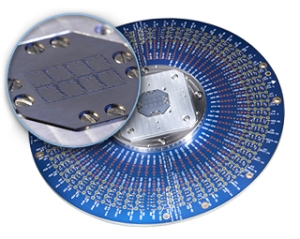Jul 13 2010
MicroProbe, Inc., a leading supplier of wafer test technology to the global semiconductor industry, today introduced the MEMS-based Mx-FinePitch (Mx-FP) product. This new class of probe card tackles the ultra-fine-pitch testing needs of leading-edge SoC and logic devices found in applications like digital cameras, set-top boxes and digital TVs.
Built for multi-DUT (Devices under Test) testing in high-volume production environments, the product requires no probe positioning adjustments throughout its lifetime. It is highly customizable for diverse application needs, providing unmatched design flexibility for SoC feature integration. Chief advantages include higher throughput, longer life and lower maintenance, which combine to reduce the overall cost of test.
 Mx-FinePitch probe card
Mx-FinePitch probe card
Multi-DUT testing is seeing increasing use as a means of reducing test costs for complex price-sensitive consumer ICs. At the same time, the combination of shrinking packaging geometries and the incorporation of new materials like low-k dielectric films, present new and unique challenges for test engineers. In particular, low-k films demand low probe force during wafer contact to protect the under-layer circuitry and prevent device damage and yield loss. These factors, along with other typical challenges associated with smaller geometries, further complicate testing, especially during high-volume production, where conventional probe cards require regular positioning adjustments to ensure accurate alignment. The adjustment requirements increase in frequency in multi-DUT environments which hinders production uptime. MicroProbe's low-force Mx-FP needs no positioning adjustments throughout its lifetime, making it an uptime-enabler and an ideal new probe card for high-volume production.
"The Mx-FP probe card offers superior electrical performance in a scalable, robust, production-proven architecture. This combination provides the highest possible yields, while maximizing utilization rates and throughput of expensive test cells," said Mike Slessor, Chief Executive Officer at MicroProbe. "We developed the product in collaboration with our customers, in anticipation of the technical and cost challenges they faced as they moved their advanced devices into high-volume production. The Mx-FP exploits the advanced MEMS technology featured in our popular Vx-MP™ and Vx-RF™ probe cards -- more than 500 of which have been shipped to customers in the last twelve months."
The Mx-FP: Advanced Test Capabilities for SOC Devices
The Mx-FP is the newest addition to MicroProbe's broad portfolio of products, including custom cantilever, vertical and advanced MEMS probe cards. For more than three decades, semiconductor manufacturers have relied on the company's diverse line of non-memory probe cards to improve yield, generate better quality die and speed time-to-profitability.
Specifically, the Mx-FP delivers:
- Fine-pitch probing, scalable down to 40um in-line and 20um/40um staggered layouts;
- Maximum pad layout flexibility, with minimal design-rule restrictions;
- In-die core pads and multi-row-pad accessibility;
- Low contact force, making it ideal for probing over active circuitry and for testing devices incorporating low-k materials;
- Replaceable MEMS probes for easy maintenance; and
- A small scrub area offering die-size reduction opportunities for pad-limited devices.
Source: http://www.microprobe.com/